Manure horns? Stirrers? These are not items you would find on an average Irish farm – at least, not today. In the past, farmers used old methods and calendars to map out their farming year; relying heavily on things like almanacs and even divination.
Today, we have peer-reviewed scientific studies, heavy machinery and best practice to go by. But some still enjoy the holistic approach to farming. This is often where organic conversions come into play.
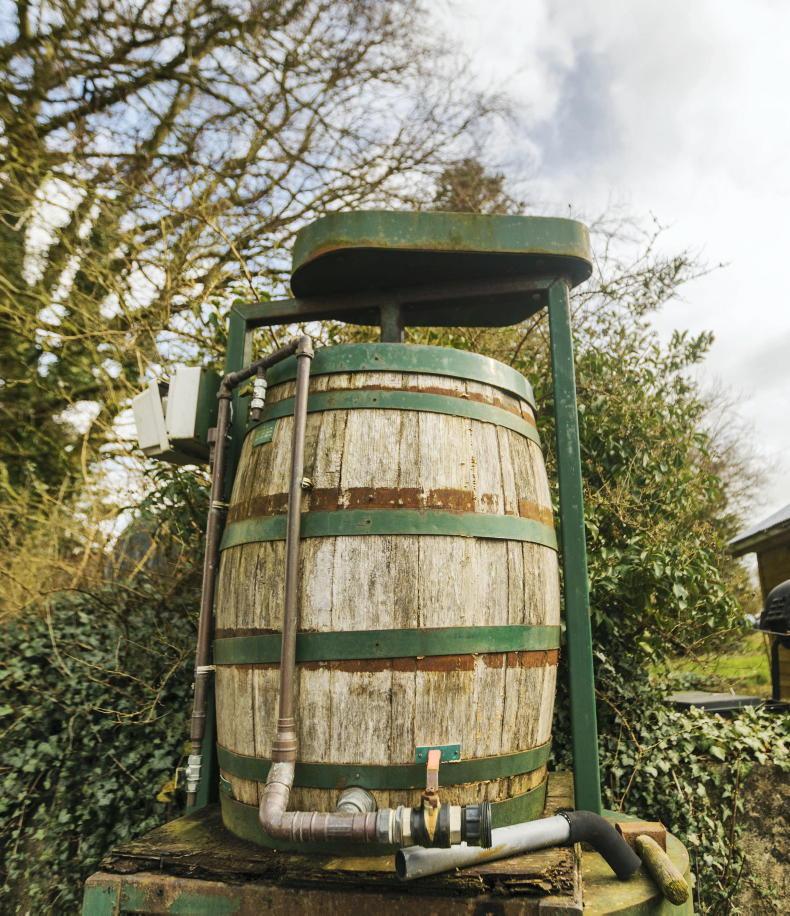
John's stirring apparatus is not like modern models; he continues to do much of his farming by hand. \ Claire Nash
If you take organic farming a step further – and add in a bit of cosmic planning – you’ll come to biodynamics. Perhaps you’ve never heard of this method, but it’s been in practise for almost a century; pre-dating and leading to modern organic farming certification.
How does it differ from organic farming?
While organic farms don’t use synthetic chemicals on their land, they can buy in certified organic inputs. In biodynamics, it’s important to use as many inputs from your own land as possible. Indeed, the main prerequisite for biodynamics is to look at your farm as one living, breathing organism which is deeply connected to both terrestrial and celestial influences.
While many agricultural professionals scoff at this method (largely because of its associated mysticism and use of astronomy), others have taken to it for its holistic, community-driven approach and – equally importantly – for the flavour and overall quality of the end product.
What is terroir?
Definition: a French term used to describe a food/drink’s characteristics or flavour; which will vary depending on the soil, environment and farming technique used to grow the ingredients.
Terroir is a word generally used when describing wine, but more recently, research has shown it also exists in Irish whiskey. The same way a grape on one side of a river in France will produce a different flavour to one grown on the other side of the river, so too will one field of barley produce a different flavour to a crop grown down the road.
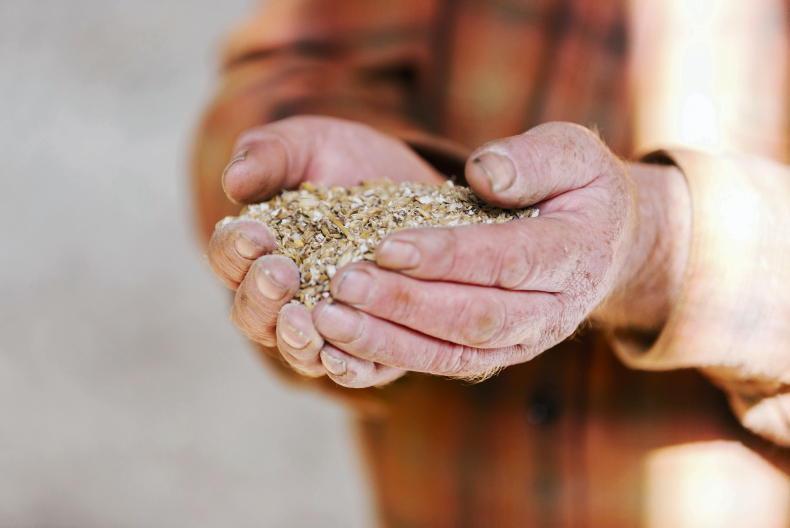
Recent studies indicate the concept of terroir; generally used in wine, also exists in Irish whiskey. \ Claire Nash
Biodynamic farmers take the concept of terroir to new territory. By using as many inputs from their own land as possible, focusing on maintaining a healthy soil and, as mentioned, approaching their farm as one living organism, the flavours produced by barley grown in this environment have taken on a unique flavour to other organic barleys.
Learning from wine
Winemakers around the world have adopted biodynamic growing methods for their grapes. Why? Because experts regularly rate biodynamic wines more highly than those grown conventionally, or even organically. It all comes down to the flavour of the end product.
Coilltroim Biodynamic Farm, Co Kildare
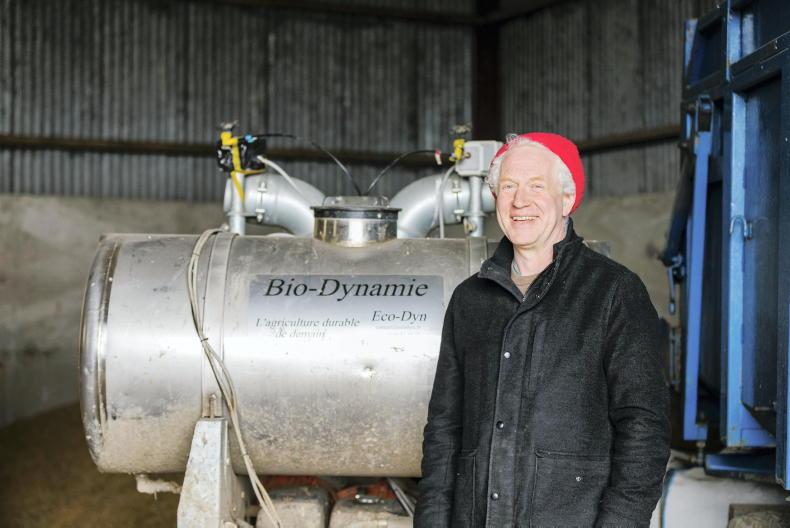
Trevor uses this sprayer to spray compost on his fields. \ Claire Nash
Trevor Harris lives and works on his 140ac farm in Co Kildare. Producing beef, oats, barley, animal feed, lamb and vegetables, he has been farming organically since the late 1990s and, in 2015, he converted once again to biodynamic farming (which takes an additional year once you are certified organic).
“Tides exist because of the gravitational pull of the moon, and no one questions this – it’s a scientific fact,” Trevor says. “Think about it: plants and animals are largely comprised of water. If the moon has such an effect on tidal movements, surely it affects us. This is why, for me, biodynamic farming makes sense.”
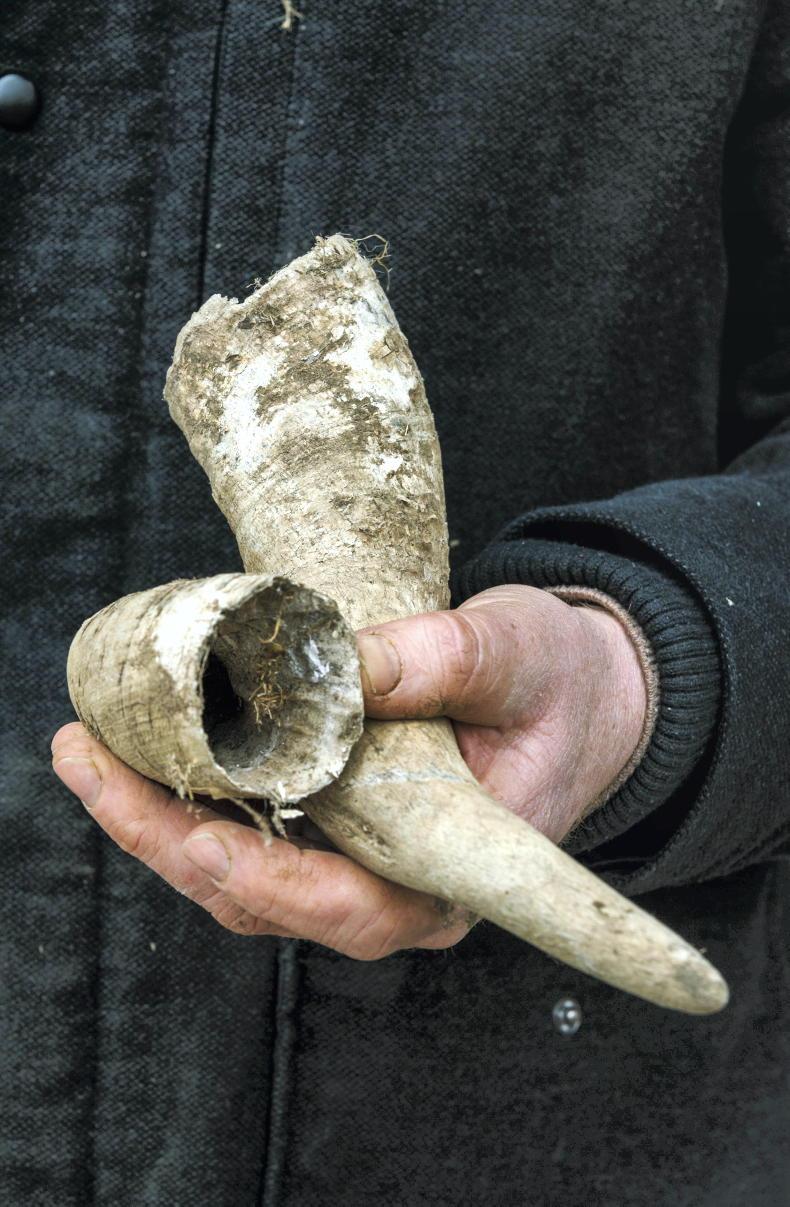
Trevor shows us the cattle horns he uses to fill with manure and silica for two of his biodynamic soil preparations. \ Claire Nash
Though he didn’t necessarily convert to biodynamics for financial reasons, early on Trevor secured a premium price from Waterford Distillery, which was encouraging. By the time he partnered with the whiskey company to supply organic barley, he had already been testing biodynamic inputs.
“Before I started growing for [Waterford Distillery], I did a trial with biodynamic preparations and then Mark Reynier [founder of Waterford Distillery] said he was interested in buying biodynamic grain – the two came at the same time, which was a nice coincidence.”
Trevor has a keen interest in soil science. He writes for the Irish Organic Association’s quarterly magazine Organic Matters and attends regular conferences, hosts farm walks and networks through a variety of regenerative agriculture groups to both share and increase his knowledge on the subject. For him, biodynamics is a scientifically sound method of regenerative agriculture.
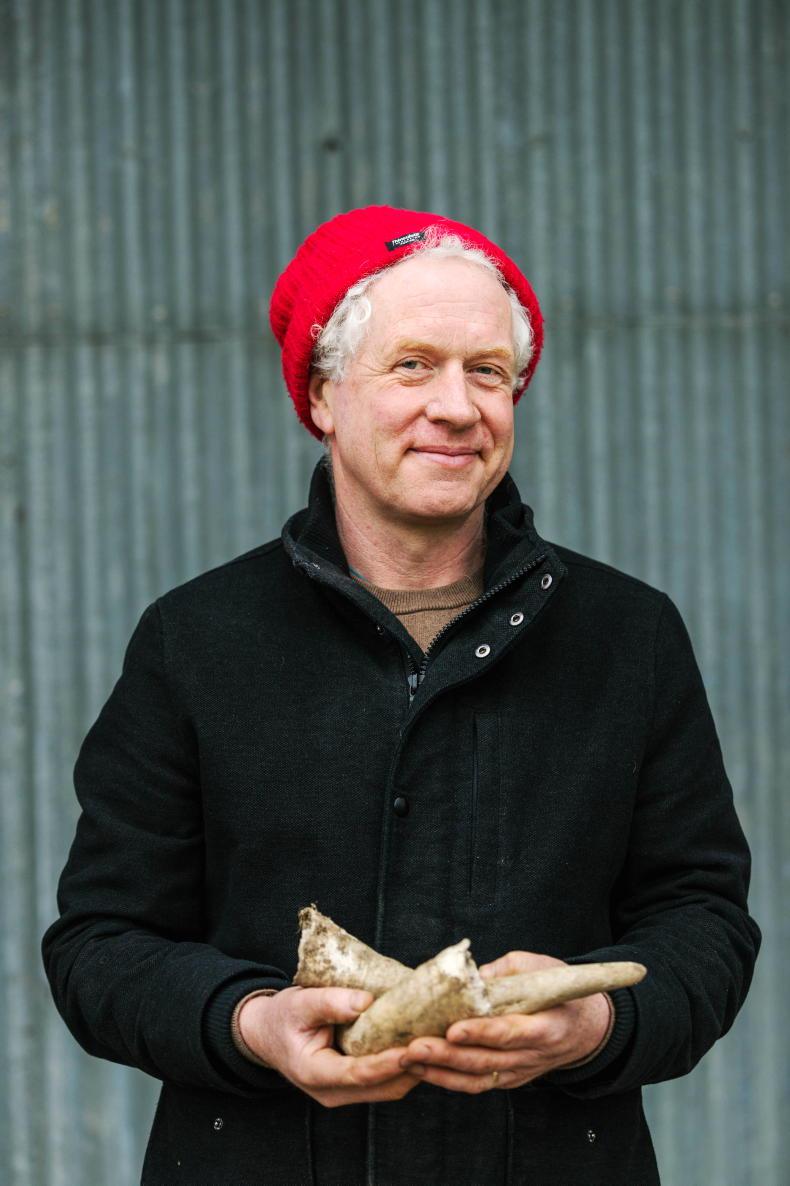
Trevor has a mixed farm with oats, barley, sheep, cows and vegetables. \ Claire Nash
“There’s a lot of new information out there [on soil health] which isn’t really that new,” he says. “Scientists are starting to look at soil in a very different way, and with biodynamics you’re focusing on healthy soil with a good balance of nutrition.
“At the centre of biodynamics is a set of natural remedies that [founder Rudolph Steiner] and a number of scientists came up with to improve soil and plant health,” he continues. “For example, horn manure is a natural preparation designed to improve humification of the soil and aid root development and germination. Then, horn silica aids photosynthesis, strengthens the plant against disease and improves the taste of the final product.”
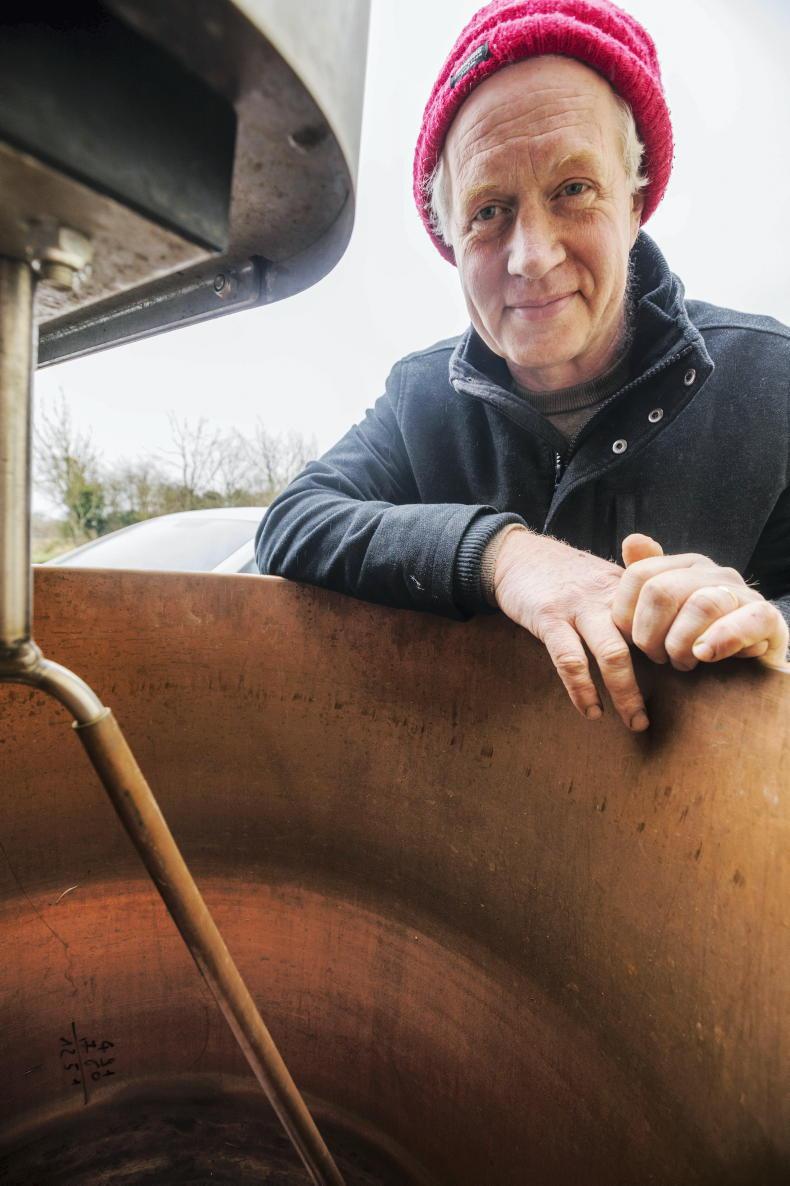
Trevor's stirrer is a more modern model, with a copper body. This is designed to stir the compost at high speeds. \ Claire Nash
He is referring to two of several specific land and compost preparation methods in biodynamic farming. Manure horns are hollowed cattle horns filled with manure and buried for the winter; silica horns are filled with powdered quartz and buried during the springtime. When they are recovered, the manure and silica are added to water, stirred in a special “stirrer” and sprayed on fields.
While he believes in the holistic and even cosmic approach to biodynamic farming, Trevor says he wouldn’t be doing it if it didn’t pay off.
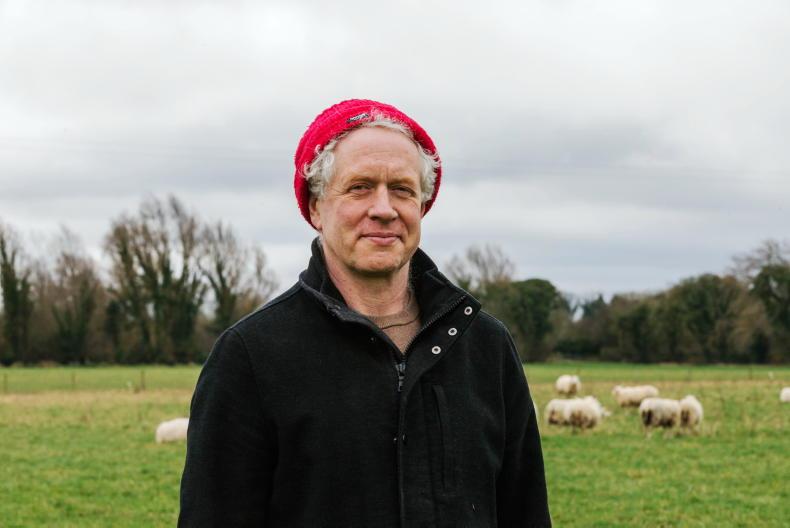
Trevor Harris of Coilltroim Biodynamic Farm, Co Kildare.\ Claire Nash
“If the economics didn’t stack up it wouldn’t be any good to me, I have a wife and five kids,” he laughs. “For me, part of my organic conversion was for financial reasons. I have more control of my business and income as an organic farmer. With biodynamics, it’s much the same or improved. With organic, you’re producing a niche product. With biodynamics, it’s a super niche product.”
Find Trevor on Instagram @coilltroimbiodynamicfarm
Shalvanstown Biodynamic Farm, Co Meath
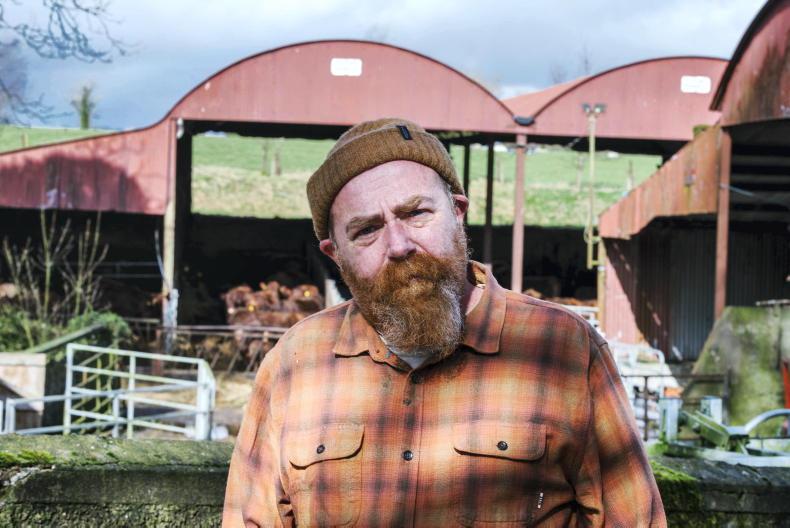
John enjoys the spiritual aspect of farming with nature. \ Claire Nash
Just as you can practise different types of yoga, the level to which farmers ascribe to biodynamics can also vary. Some are really into the mystical aspect of the method, which looks at the potential celestial and terrestrial effects on the earth and Pagan-like beliefs surrounding the relationship we have with nature, others not as much.
John McDonnell has been practising biodynamic farming since the mid 1990s, and while his farm is how he makes a living, he also considers the mystical approach a fun way to connect with and involve his local community. He thinks we shouldn’t take life, or agriculture, too seriously.
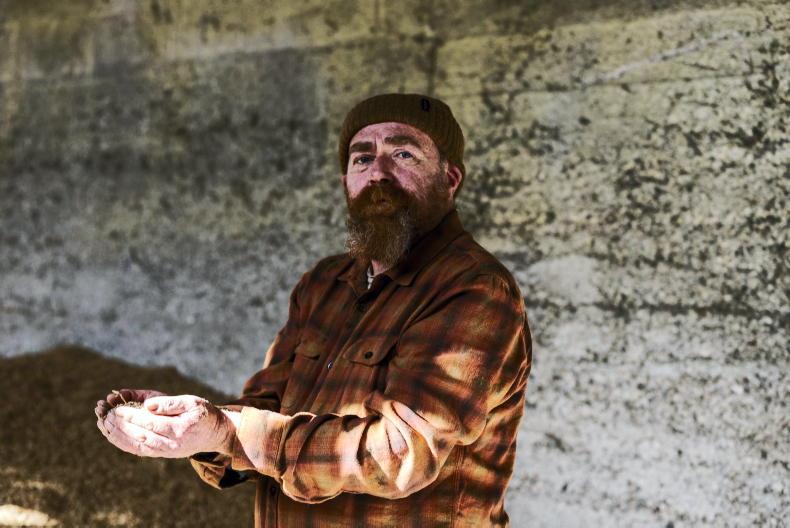
Both John and Trevor supply Waterford Distillery with biodynamic barley. \ Claire Nash
“You can see biodynamics as a sympathetic magic, almost,” he muses. “Most people aren’t in that mindset and it can seem a bit strange to them.”
John says biodynamic farming goes back more than 30 years in Ireland, though most aren’t farming at larger commercial levels like he and Trevor. To be certified, you now go through the UK Demeter group via the Irish Organic Association. Previously, biodynamic farmers were licensed through the Biodynamic Agriculture Association of Ireland.
He says it takes tremendous willpower, and a belief and love in the practice to do it successfully.
“It’s difficult to achieve but it’s fun to do, so I try to turn it into an experiential thing,” he explains. “Some [biodynamic] farmers have expensive equipment but I’m nearly back to doing everything by hand.”
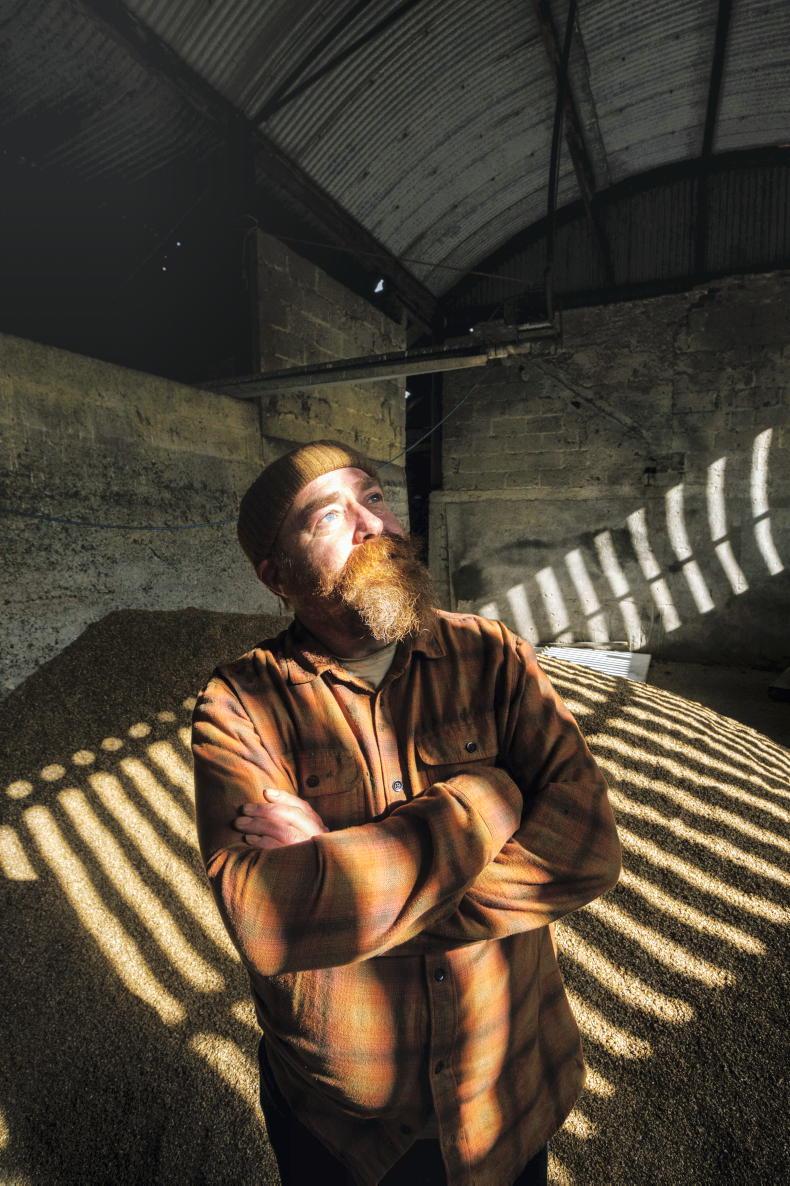
John adheres to the biodynamic guideline of farming for good and not just financial reasons.\ Claire Nash
John produces beef and grain on his farm, though, like Trevor, he says his main income and only biodynamic premium comes from the barley he grows for Waterford Distillery. He enjoys the spiritual aspect of farming with nature. While he understands it’s not everyone’s cup of tea, he laughs at the idea that farming shouldn’t be approached philosophically.
“Farming is the basis of all philosophy,” he retorts. “The first picture book we ever show a child is a duck and a farmer; a cow and a dog. It begins the expansion of your understanding of the world.
“Celebrating the diversity in agriculture is amazing,” he continues. “[Before modern science], it was all about elves and gnomes, and I like that idea of elemental nature. Back then, it was a way to explain the forces [in nature] taking place. They personified them through these legends and stories. [For me], agriculture has to be both scientific and spiritual. After all, we’re working with living forces.”
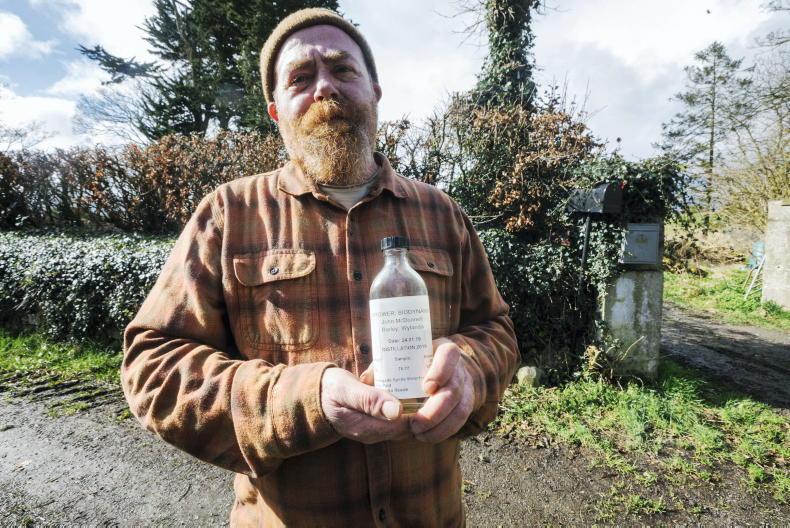
John holds a sample of the Waterford Distillery whiskey he supplied barley for. \ Claire Nash
John is always aiming to improve farming methods. He is focused on less ploughing and more direct drilling, putting in companion crops with his barley and developing more cover cropping. He aims to use more heritage grain varieties in the coming seasons.
“There’s still a lot of work to do, but excitement, too. I’m working with some pretty good people on soil biology and developing the composting process. There’s lots on the horizon.
“It’s OK to be a bit crazy,” he smiles. “[Farmers] can be so weighed down with the burden of responsibility.”
Find out more: beefbox.ie
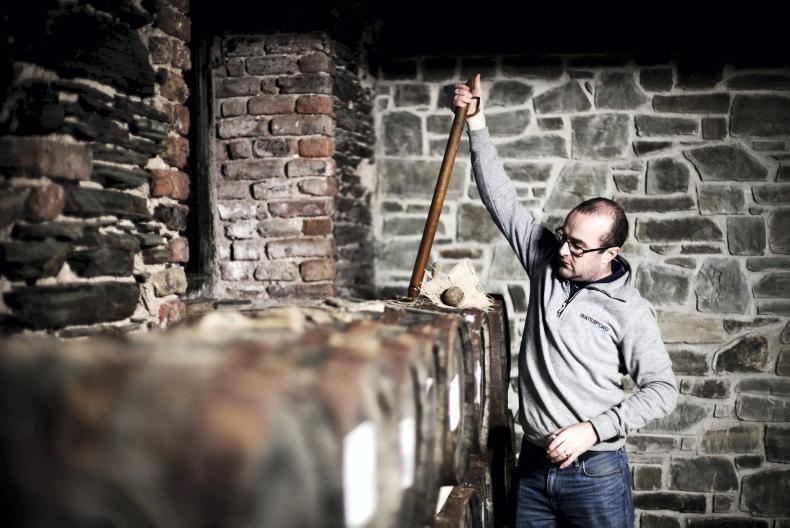
Neil Conway is the head distiller at Waterford Distillery. They will be launching their biodynamic whiskey toward the end of this year.
Currently, there isn’t much of a chance for Irish farmers to make a biodynamic premium on their product – unless, that is, they happen to grow barley for Waterford Distillery.
Head brewer Neil Conway explains why Waterford Distillery are willing to pay above the organic premium for biodynamic barley.
“We’re not interested in yield,” he says. “[These farmers] are getting above the organic standard per tonne because we know it yields poorly – they wouldn’t be able to do this if they were supplying into the conventional food chain. We’re not overly interested in competitors at the moment; most other Irish whiskey makers are buying in grain from Europe because it’s cheaper.”
ICL asks Neil if there is a difference between the organic barley Waterford Distillery uses to make their single-field Irish whisky and the biodynamic whiskey, which is still ageing and not due on the market until later this year.
“From the biodynamic batches we have identified individual flavours from different terroirs,” he says. “I’ll never say the biodynamic whiskey is better, I’ll just say different. It’s a different complexity. We’ll have to wait until it matures, but for now we feel it’s more earthy, malty and wholesome in flavour.
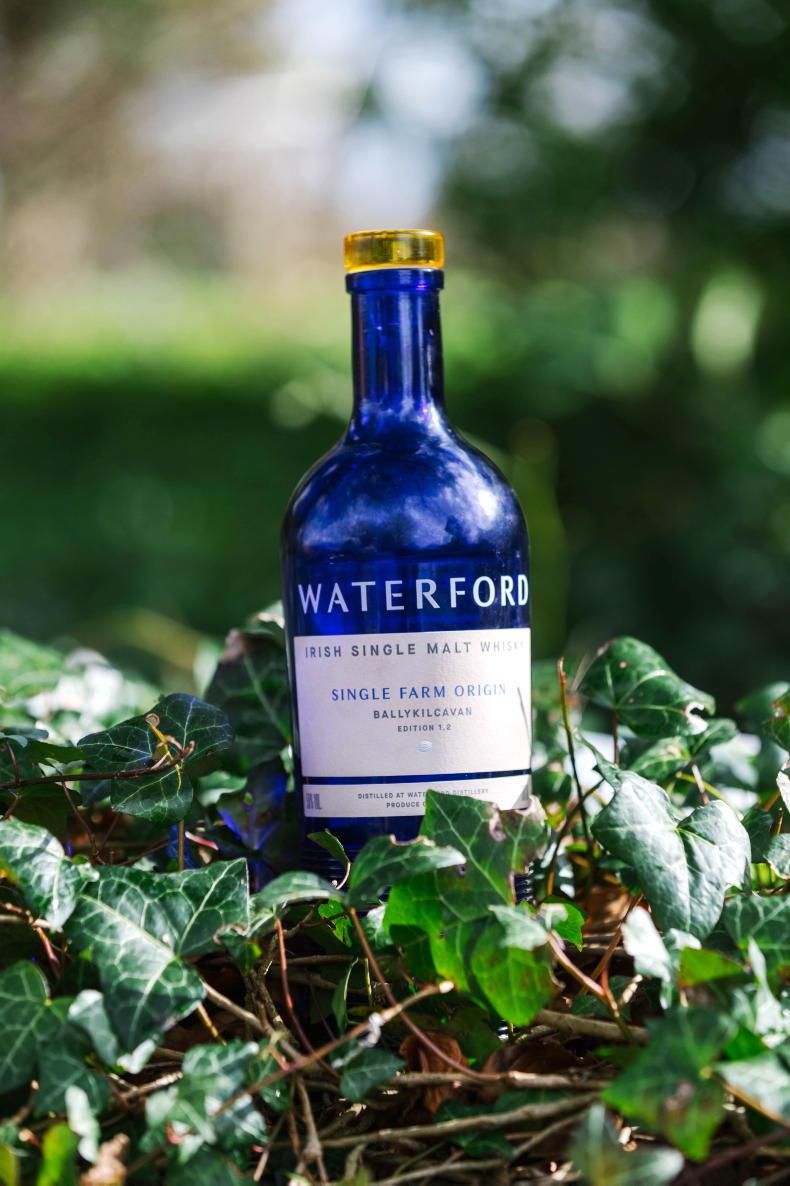
This is the first batch of organic Waterford Distillery whiskey with which Trevor was involved. Their biodynamic whiskey will launch later this year. \ Claire Nash
“We know and understand [biodynamic whiskey] is not for everybody,” he continues. “The wine customer understands terroir and vintages; that’s who we’re reaching out to.”
Waterford Distillery recently shared the results of their Whisky Terroir Project (in partnership with Teagasc and Enterprise Ireland, among others), which proved that location and microclimate have an effect on a finished spirit, depending on when and where the barley is grown.
“We have the right climate for tillage farmers, and flavour comes from the ground – it’s from where the plant grows,” he says. “Soil maintenance, climate – everything has an impact on how your plant grows. We brought that ideology to growing barley and we believe the where, when, topography and biology – and the farming method – has an impact on the final flavour.”
Though they are not disclosing the exact price per tonne being paid for biodynamic barley, Neil says it costs Waterford Distillery approximately double the price of conventional (roughly 75% of the barley they purchase is conventional, while the rest is from a mixture of organic, biodynamic and heritage barley).
waterfordwhisky.com
Did you know?
If you use natural skin care products, they may be certified biodynamic without you even realising.
Dr Hauschka skincare products are biodynamic. The range was developed in Germany, one of the leading countries in biodynamic agriculture, and the products are still made using botanicals grown in their own garden.
“More than 150 different plant species flourish here, ready to be used in Dr. Hauschka Skin Care and WALA Medicines (made by WALA Heilmittel, the manufacturer of Dr. Hauschka Skin Care),” a representative tells ICL. “The 11ac plot is continuously tended by six gardeners using biodynamic methods. Over time, their work has made the soil fertile and crumbly. Compost created within the garden improves the soil’s structure and promotes the healthy growth of the plants. Our garden is as closed and self-sustaining a cycle as possible—and it also provides a habitat for wild plants and animals.”
For more information visit:1 Demeter International – demeter.net
2 Biodynamic Agriculture Association of Ireland
– biodynamicagriculture.ie
Manure horns? Stirrers? These are not items you would find on an average Irish farm – at least, not today. In the past, farmers used old methods and calendars to map out their farming year; relying heavily on things like almanacs and even divination.
Today, we have peer-reviewed scientific studies, heavy machinery and best practice to go by. But some still enjoy the holistic approach to farming. This is often where organic conversions come into play.

John's stirring apparatus is not like modern models; he continues to do much of his farming by hand. \ Claire Nash
If you take organic farming a step further – and add in a bit of cosmic planning – you’ll come to biodynamics. Perhaps you’ve never heard of this method, but it’s been in practise for almost a century; pre-dating and leading to modern organic farming certification.
How does it differ from organic farming?
While organic farms don’t use synthetic chemicals on their land, they can buy in certified organic inputs. In biodynamics, it’s important to use as many inputs from your own land as possible. Indeed, the main prerequisite for biodynamics is to look at your farm as one living, breathing organism which is deeply connected to both terrestrial and celestial influences.
While many agricultural professionals scoff at this method (largely because of its associated mysticism and use of astronomy), others have taken to it for its holistic, community-driven approach and – equally importantly – for the flavour and overall quality of the end product.
What is terroir?
Definition: a French term used to describe a food/drink’s characteristics or flavour; which will vary depending on the soil, environment and farming technique used to grow the ingredients.
Terroir is a word generally used when describing wine, but more recently, research has shown it also exists in Irish whiskey. The same way a grape on one side of a river in France will produce a different flavour to one grown on the other side of the river, so too will one field of barley produce a different flavour to a crop grown down the road.

Recent studies indicate the concept of terroir; generally used in wine, also exists in Irish whiskey. \ Claire Nash
Biodynamic farmers take the concept of terroir to new territory. By using as many inputs from their own land as possible, focusing on maintaining a healthy soil and, as mentioned, approaching their farm as one living organism, the flavours produced by barley grown in this environment have taken on a unique flavour to other organic barleys.
Learning from wine
Winemakers around the world have adopted biodynamic growing methods for their grapes. Why? Because experts regularly rate biodynamic wines more highly than those grown conventionally, or even organically. It all comes down to the flavour of the end product.
Coilltroim Biodynamic Farm, Co Kildare

Trevor uses this sprayer to spray compost on his fields. \ Claire Nash
Trevor Harris lives and works on his 140ac farm in Co Kildare. Producing beef, oats, barley, animal feed, lamb and vegetables, he has been farming organically since the late 1990s and, in 2015, he converted once again to biodynamic farming (which takes an additional year once you are certified organic).
“Tides exist because of the gravitational pull of the moon, and no one questions this – it’s a scientific fact,” Trevor says. “Think about it: plants and animals are largely comprised of water. If the moon has such an effect on tidal movements, surely it affects us. This is why, for me, biodynamic farming makes sense.”

Trevor shows us the cattle horns he uses to fill with manure and silica for two of his biodynamic soil preparations. \ Claire Nash
Though he didn’t necessarily convert to biodynamics for financial reasons, early on Trevor secured a premium price from Waterford Distillery, which was encouraging. By the time he partnered with the whiskey company to supply organic barley, he had already been testing biodynamic inputs.
“Before I started growing for [Waterford Distillery], I did a trial with biodynamic preparations and then Mark Reynier [founder of Waterford Distillery] said he was interested in buying biodynamic grain – the two came at the same time, which was a nice coincidence.”
Trevor has a keen interest in soil science. He writes for the Irish Organic Association’s quarterly magazine Organic Matters and attends regular conferences, hosts farm walks and networks through a variety of regenerative agriculture groups to both share and increase his knowledge on the subject. For him, biodynamics is a scientifically sound method of regenerative agriculture.

Trevor has a mixed farm with oats, barley, sheep, cows and vegetables. \ Claire Nash
“There’s a lot of new information out there [on soil health] which isn’t really that new,” he says. “Scientists are starting to look at soil in a very different way, and with biodynamics you’re focusing on healthy soil with a good balance of nutrition.
“At the centre of biodynamics is a set of natural remedies that [founder Rudolph Steiner] and a number of scientists came up with to improve soil and plant health,” he continues. “For example, horn manure is a natural preparation designed to improve humification of the soil and aid root development and germination. Then, horn silica aids photosynthesis, strengthens the plant against disease and improves the taste of the final product.”

Trevor's stirrer is a more modern model, with a copper body. This is designed to stir the compost at high speeds. \ Claire Nash
He is referring to two of several specific land and compost preparation methods in biodynamic farming. Manure horns are hollowed cattle horns filled with manure and buried for the winter; silica horns are filled with powdered quartz and buried during the springtime. When they are recovered, the manure and silica are added to water, stirred in a special “stirrer” and sprayed on fields.
While he believes in the holistic and even cosmic approach to biodynamic farming, Trevor says he wouldn’t be doing it if it didn’t pay off.

Trevor Harris of Coilltroim Biodynamic Farm, Co Kildare.\ Claire Nash
“If the economics didn’t stack up it wouldn’t be any good to me, I have a wife and five kids,” he laughs. “For me, part of my organic conversion was for financial reasons. I have more control of my business and income as an organic farmer. With biodynamics, it’s much the same or improved. With organic, you’re producing a niche product. With biodynamics, it’s a super niche product.”
Find Trevor on Instagram @coilltroimbiodynamicfarm
Shalvanstown Biodynamic Farm, Co Meath

John enjoys the spiritual aspect of farming with nature. \ Claire Nash
Just as you can practise different types of yoga, the level to which farmers ascribe to biodynamics can also vary. Some are really into the mystical aspect of the method, which looks at the potential celestial and terrestrial effects on the earth and Pagan-like beliefs surrounding the relationship we have with nature, others not as much.
John McDonnell has been practising biodynamic farming since the mid 1990s, and while his farm is how he makes a living, he also considers the mystical approach a fun way to connect with and involve his local community. He thinks we shouldn’t take life, or agriculture, too seriously.

Both John and Trevor supply Waterford Distillery with biodynamic barley. \ Claire Nash
“You can see biodynamics as a sympathetic magic, almost,” he muses. “Most people aren’t in that mindset and it can seem a bit strange to them.”
John says biodynamic farming goes back more than 30 years in Ireland, though most aren’t farming at larger commercial levels like he and Trevor. To be certified, you now go through the UK Demeter group via the Irish Organic Association. Previously, biodynamic farmers were licensed through the Biodynamic Agriculture Association of Ireland.
He says it takes tremendous willpower, and a belief and love in the practice to do it successfully.
“It’s difficult to achieve but it’s fun to do, so I try to turn it into an experiential thing,” he explains. “Some [biodynamic] farmers have expensive equipment but I’m nearly back to doing everything by hand.”

John adheres to the biodynamic guideline of farming for good and not just financial reasons.\ Claire Nash
John produces beef and grain on his farm, though, like Trevor, he says his main income and only biodynamic premium comes from the barley he grows for Waterford Distillery. He enjoys the spiritual aspect of farming with nature. While he understands it’s not everyone’s cup of tea, he laughs at the idea that farming shouldn’t be approached philosophically.
“Farming is the basis of all philosophy,” he retorts. “The first picture book we ever show a child is a duck and a farmer; a cow and a dog. It begins the expansion of your understanding of the world.
“Celebrating the diversity in agriculture is amazing,” he continues. “[Before modern science], it was all about elves and gnomes, and I like that idea of elemental nature. Back then, it was a way to explain the forces [in nature] taking place. They personified them through these legends and stories. [For me], agriculture has to be both scientific and spiritual. After all, we’re working with living forces.”

John holds a sample of the Waterford Distillery whiskey he supplied barley for. \ Claire Nash
John is always aiming to improve farming methods. He is focused on less ploughing and more direct drilling, putting in companion crops with his barley and developing more cover cropping. He aims to use more heritage grain varieties in the coming seasons.
“There’s still a lot of work to do, but excitement, too. I’m working with some pretty good people on soil biology and developing the composting process. There’s lots on the horizon.
“It’s OK to be a bit crazy,” he smiles. “[Farmers] can be so weighed down with the burden of responsibility.”
Find out more: beefbox.ie

Neil Conway is the head distiller at Waterford Distillery. They will be launching their biodynamic whiskey toward the end of this year.
Currently, there isn’t much of a chance for Irish farmers to make a biodynamic premium on their product – unless, that is, they happen to grow barley for Waterford Distillery.
Head brewer Neil Conway explains why Waterford Distillery are willing to pay above the organic premium for biodynamic barley.
“We’re not interested in yield,” he says. “[These farmers] are getting above the organic standard per tonne because we know it yields poorly – they wouldn’t be able to do this if they were supplying into the conventional food chain. We’re not overly interested in competitors at the moment; most other Irish whiskey makers are buying in grain from Europe because it’s cheaper.”
ICL asks Neil if there is a difference between the organic barley Waterford Distillery uses to make their single-field Irish whisky and the biodynamic whiskey, which is still ageing and not due on the market until later this year.
“From the biodynamic batches we have identified individual flavours from different terroirs,” he says. “I’ll never say the biodynamic whiskey is better, I’ll just say different. It’s a different complexity. We’ll have to wait until it matures, but for now we feel it’s more earthy, malty and wholesome in flavour.

This is the first batch of organic Waterford Distillery whiskey with which Trevor was involved. Their biodynamic whiskey will launch later this year. \ Claire Nash
“We know and understand [biodynamic whiskey] is not for everybody,” he continues. “The wine customer understands terroir and vintages; that’s who we’re reaching out to.”
Waterford Distillery recently shared the results of their Whisky Terroir Project (in partnership with Teagasc and Enterprise Ireland, among others), which proved that location and microclimate have an effect on a finished spirit, depending on when and where the barley is grown.
“We have the right climate for tillage farmers, and flavour comes from the ground – it’s from where the plant grows,” he says. “Soil maintenance, climate – everything has an impact on how your plant grows. We brought that ideology to growing barley and we believe the where, when, topography and biology – and the farming method – has an impact on the final flavour.”
Though they are not disclosing the exact price per tonne being paid for biodynamic barley, Neil says it costs Waterford Distillery approximately double the price of conventional (roughly 75% of the barley they purchase is conventional, while the rest is from a mixture of organic, biodynamic and heritage barley).
waterfordwhisky.com
Did you know?
If you use natural skin care products, they may be certified biodynamic without you even realising.
Dr Hauschka skincare products are biodynamic. The range was developed in Germany, one of the leading countries in biodynamic agriculture, and the products are still made using botanicals grown in their own garden.
“More than 150 different plant species flourish here, ready to be used in Dr. Hauschka Skin Care and WALA Medicines (made by WALA Heilmittel, the manufacturer of Dr. Hauschka Skin Care),” a representative tells ICL. “The 11ac plot is continuously tended by six gardeners using biodynamic methods. Over time, their work has made the soil fertile and crumbly. Compost created within the garden improves the soil’s structure and promotes the healthy growth of the plants. Our garden is as closed and self-sustaining a cycle as possible—and it also provides a habitat for wild plants and animals.”
For more information visit:
1 Demeter International – demeter.net
2 Biodynamic Agriculture Association of Ireland
– biodynamicagriculture.ie




















 This is a subscriber-only article
This is a subscriber-only article





SHARING OPTIONS: